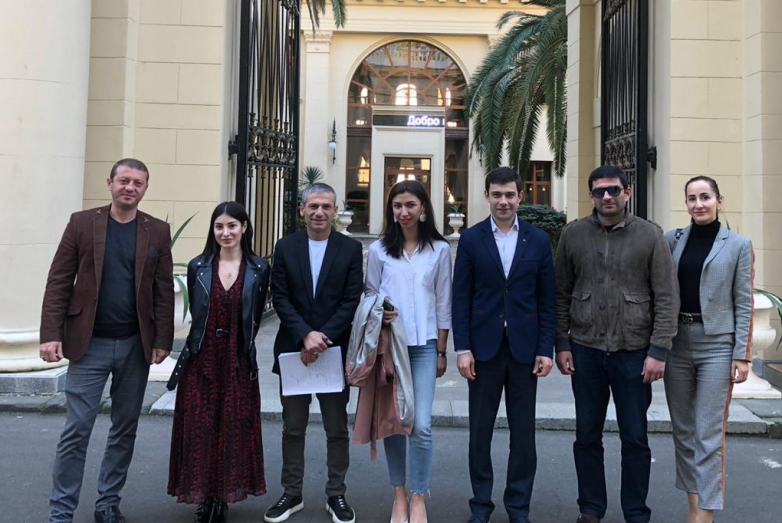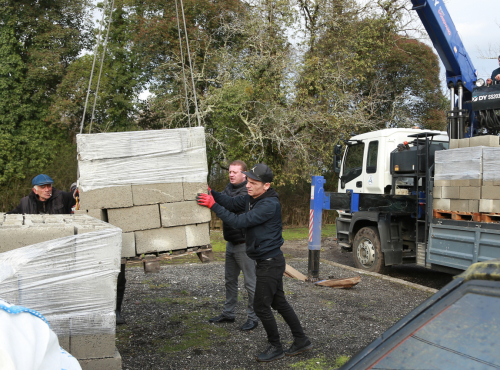The World Abaza Congress increased the number of local branches in Abkhazia, creating a new branch in Gagra.
The local branch of the WAC was created during a meeting with residents of the Gagra district on March 5. Representatives of the WAC Inar Gitsba, Levan Torchua and Inver Alshundba introduced the activities of the Congress and the immediate plans of the organization to local residents.
Inar Gitsba, Executive Secretary of the Congress, told the meeting participants that the main goal of creating local branches was to implement projects along with initiative citizens that would improve the quality of life on the ground.
“First of all, we want to make people understand that everyone at their own level can be beneficial. First in his yard, then in his town, and then on the scale of the Republic. If we can unite people in a determined desire to create, we can say that the goal is achieved,” Gitsba said.
He called on local people to be proactive for effective collaboration.
“In order to implement this or that project, you need to take the initiative and voice it first. Besides the problems - they are similar for each locality and region - it is important to understand the potential of [the region]. Start with small projects and move on to more global ones. The long road begins with the first step,” said Inar Gitsba.
One of the participants in the meeting, Elanna Agrba, believes that the problems and priority projects for implementation are on the surface and obvious to the concerned citizens.
“While I was listening to a speech by Congress staff on possible projects, a lot of ideas flashed in my head for a second for projects in various fields. It’s enough just to walk along the street to see a lot of problems that the indifferent Gagra residents will point to,” said Agrba, adding that “global changes begin with the solution of “small-town” problems.”
She regretted that the town of Gagra, which was once the cultural capital, is now in stagnation.
“The Gagra district for Abkhazia was once like St. Petersburg for Russia. And today we are not developing, but degrading. I believe that Gagra needs to be revived. Gagra district has a huge resource compared to other regions that are really in difficult situations. It is necessary to return culture to Gagra, to hold festivals, art projects here,” Agrba believes.
Citizen Natalya Bartsyts at the first meeting proposed projects to preserve the culture and history of the town, as well as educational projects.
“For me, Gagra is little Nice, just as for any old-timer. I love Europe, but what is attractive in Europe is not always attractive with us. Preservation of cultural values for me as an ethnic Abkhaz is very important. We have a rich, beautiful culture. I would really like to have the Gagra Museum - so that every child knows the history of his hometown. To let the children know that Gagra is famous, for example, by the climate station, built in 1903, that the first map of the town of Gagra is in the church of St. Mark in Venice. There are many facts to be proud of,” says Bartsyts.
She also noted that in recent years she has heard a lot about the activities of the WAC and the successful projects of the Congress in the regions of the Republic, which, in her opinion, are successful due to the “enthusiasm and warmth” of the team.
“The Congress has consolidated people who are not indifferent to the fate of their country. It's nice that there will be someone next to the Gagra residents in solving pressing problems. With active people with great potential, I think one can [do a lot]. Problems arising with such a team are resolved faster and more efficiently,” the meeting participant is sure.
At the end of the meeting, citizens filled out an application for membership in the World Abaza Congress.
Elanna Agrba was appointed head of the Local branch. It also included David Bagatelia, Astamur Aristava, Anri Butba, Natalya Bartsyts. The opening of the local branch of the WAC in Gagra increased the number of branches in Abkhazia and Turkey to 35.


to login or register.